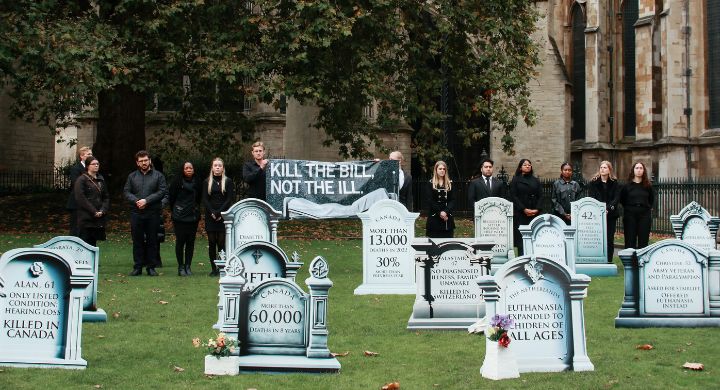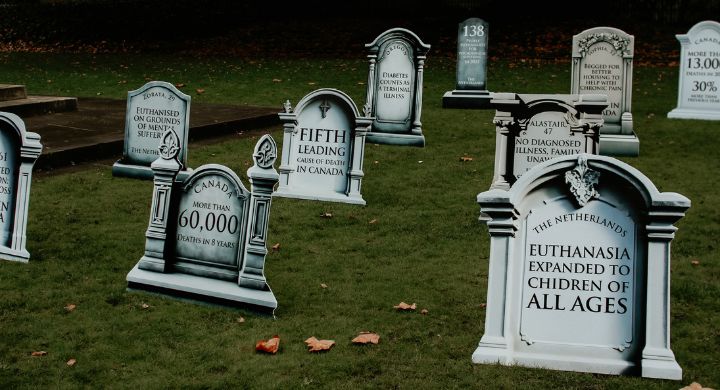Gravestone demonstration warns of the dangerous ramifications of assisted suicide bill
Yesterday, MP Kim Leadbeater’s Terminally Ill Adults (End of Life) Bill, which seeks to legalise assisted suicide, had its first reading in parliament.
Seeking to raise awareness about the devastating implications of this proposed bill, Christian Concern hosted a visual demonstration outside parliament with support from Distant Voices, the Christian Medical Fellowship, SPUC, and other organisations.
Calling on MPs to “kill the bill, not the ill”, Christian Concern brought to light the extreme consequences seen around the world in places where assisted suicide and euthanasia have already been legalised.
In a poignant visual demonstration of the deadly reality of legalising assisted suicide, campaigners created a mock-up of a graveyard with groups of mourners dressed in black.
Each tombstone presented a shocking statistic from overseas or shared a tragic story from those directly affected by euthanasia and assisted suicide.
Using statistics from Canada and other countries that have already legalised assisted suicide, the display demonstrated the bill’s far-reaching consequences that would lead to more suffering, harm, and coercion.
This visualisation of assisted suicide had a thought-provoking impact on passers-by, as many people stopped to read the gravestone facts, show their support, or ask questions about the concerning implications of the bill that they had previously been unaware of.
By vividly revealing the reality of assisted suicide, Christian Concern and the other campaign groups present painted a startling picture of the deadly impact that legalising suicide would have on our culture, our social morality, and most importantly the vulnerable members of our society.

Testimonies from the victims of euthanasia
Each of the stories portrayed on gravestones during the demonstration were real-life testimonies of victims who had either lost their lives to euthanasia or were offered assisted suicide as a reasonable alternative to adequate support.
Alan Nichols (61) was euthanised in Canada. His only listed condition, and reason for seeking assisted suicide, was hearing loss. His family, left traumatised by his death, were convinced that he should have been supported to live rather than euthanised. Alan’s brother, Gary, stated that, “He was basically put to death … he needed some help from us, but he was not so disabled that he qualified for euthanasia.”
Godelieva de Troyer, a 64-year-old woman who had battled severe depression for years, was euthanised in Belgium without her family being properly notified or given a chance to ask her to reconsider.
In the Netherlands, after a long struggle with mental health and depression, 29-year-old Zoraya ter Beek was euthanised on the grounds of unbearable mental suffering that could not be remedied. Despite being physically healthy, she was not supported to live and overcome her depression but was rather encouraged that death was the only escape for her.
Revealing the justified distrust that legalising assisted suicide causes in patient-doctor relationships, after failed palliative care treatment in Belgium, Alexina Wattiez (36) died after her nurses smothered her with a pillow.

A chemistry teacher from the UK, Alastair Hamilton (47), was killed in Switzerland without his family being made aware of his intentions. Thinking that he was going to visit a friend in Paris, his father dropped him off at the airport, unaware that it would be his final trip. His devastated mother shared the traumatic effect his unexpected death had on the family: “We weren’t given that chance to either be with him or in my case, drag him home, tooth and nail if I had to.”
In Canada, ‘Sophia’ (51) resorted to ending her life by euthanasia after ‘begging’ unsuccessfully for better housing to support her in living with chronic pain.
In another Canadian case, an army veteran and Paralympian, Christine Gauthier (52) asked for a stairlift but was offered euthanasia instead. She said that rather than being supported to live well, she received a letter saying, “If you’re so desperate, madam, we can offer you MAID, medical assistance in dying.”
Christian Concern and the other campaigners all warned that these kinds of stories would become commonplace if the UK introduces assisted suicide. They also cautioned that overseas evidence demonstrates that we will quickly see the same processes used to remove all meaningful safeguards here in the UK.
In Canada, the number of those dying by ‘medical assistance in dying’ (MAiD) has risen twelvefold since its introduction in 2016. Initially, only those whose death was ‘reasonably foreseeable’ were eligible but following legal cases and campaigning, MAiD has been extended even to those suffering solely from mental illness. MAiD now accounts for over 4% of deaths in the country and is the fifth leading cause of death.
‘Suicide is not the answer’
Nikki Kenward, as a member of the campaign group Distant Voices, was one of the campaigners protesting the proposed legalisation of assisted suicide.
Shortly after her marriage to her husband Merv, Nikki contracted the Guillain-Barré Syndrome virus, which is an autoimmune disease where the body’s immune system attacks part of the nervous system.
This virus left her in a condition where she was only able to blink one eye. She found herself locked into her own body and admitted that at times her life seemed unbearable.
Her lengthy hospital stay, and her unlikely recovery, taught both Nikki and Merv a great deal about life, death and the questions surrounding end-of-life decisions. Throughout this journey, they realised how easy it would have been, had euthanasia been legal, for the medical system or grieving family members to opt for euthanasia rather than sustaining and supporting life.
Nikki said: “If you’d asked me then, I would have said I’d rather not live. Just one of my eyes would open and I think if my family had been asked by the hospital they’d have opted to end my life. I hadn’t seen my son for months and the thought of him being without me broke my heart more than what was happening to me.”
She said that, now having seen her son grow up and married, she is grateful that her family did not have the option to make a choice between life or assisted suicide. By joining Christian Concern in the demonstration, she further bolstered her claim that she is living proof that people should carry on living.
Rather than supporting assisted suicide, she said, “I believe that suicide is not the answer, the answer is to be cared for with absolutely brilliant, palliative care.”
Supporting this view, Dr Mark Pickering (Christian Medical Fellowship), said that “The palliative care movement brings compassion and dignity to all at the end of life; it gives reasonable choice without false hope. The thing that’s really cruel and broken about our current situation is that thousands of people die each year without access to the excellent palliative care that can transform bad deaths into good ones.”
Warning about the wider ramifications of legalising assisted suicide in the UK, Alithea Williams from SPUC said: “Once assisted suicide is permitted, the ethic of medicine, which is to care and not kill, will be changed forever. State-sanctioned death is even recommended in some quarters as a means to save health services money and free up hospital beds. This utilitarian view dehumanises patients and ultimately seeks to kill them.”
Not ‘better off dead’
Christian Concern continues to fight the idea that some people are ‘better off dead’ and advocates for better palliative care and support for people at the end of their lives.
Andrea Williams, chief executive of Christian Concern said:
“Assisted suicide claims to be compassionate but, in fact, it turns vulnerable people into problems that can be ‘fixed’ with a lethal injection.
“The statistics we displayed outside parliament on Wednesday show that the slippery slope is real. Once a country legalises assisted suicide, the ‘safeguards’ inevitably get widened and vulnerable feel pressure to end their lives.
“The message sent by a society that legalises assisted suicide is that some lives are not worth living. People start to believe that the elderly or the sick are ‘better off dead’.
“Helping people to end their lives is neither compassionate nor caring.
“Parliament and the courts have rightly refused to change the law multiple times in the last few decades. This new parliament needs to decide once again that human life deserves protection and care. We cannot be a society that believes some people are ‘better off dead’.”
Our demonstration received extensive media coverage as well as a number of interviews. We were featured in the BBC, Times, Mail, Evening Standard, ITV, LBC, and the Washington Times.


